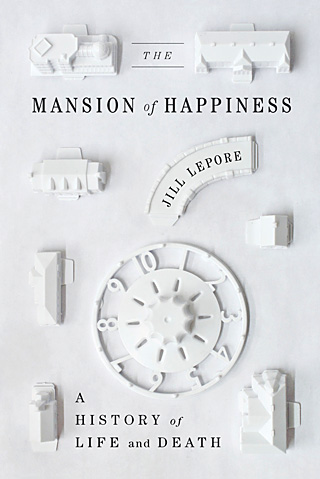The Mansion of Happiness by Jill Lepore
 The Mansion of Happiness
The Mansion of Happiness
by Jill Lepore
(Knopf)
The Mansion of Happiness is In Jill Lepore’s seventh novel, and the title is derived from a popular board game of the same name, created by Milton Bradley. Lepore describes the book as a “history of curiosity,†and rightfully so, as it’s filled with historical facts, figures, statistics, quotations and very little opinions or philosophies.
In the book, Lepore discusses many little-known or virtually ignored historical facts, such as the origins of using mice for experiments, the origins of reproductive egg discovery, how breast pumps became accessories, the controversial nature of birth control and the origins of children’s libraries and children’s sexual discovery.
“In the age of progress, with all its machines, the world of adults was thought to be ruthless: cold, industrial, and grinding. Reformers wanted childhood, a world of little women and little men, to be a place apart, a paradise…â€
Lepore also mentions groups such as The American Institute of Family Relations, which helped to avert “biologically superior†married couples from splitting up, as well as Scientific Management in the workplace and the Kitchen Efficient in the home. She provides interesting facts such as, “The word ‘parenthood’ dates only to the middle of the nineteenth century.â€
The novel really becomes interesting, especially in the chapter called, “Old Age,†which contains this quote from David Hackett Fischer: “The people of early America exalted old age; their descendants have made a cult of youth.†In this chapter, Lepore explores how the afterlife became obsolete when people began finding ways to live longer, while in the following chapter, she explores the government’s role in denying healthcare and the ‘right to live’ to those who are disabled, poor or insane: “Only beginning in 1958 did the majority of American deaths take place in a hospital. When death moved away from the home, doctors, hospitals, and insurance companies took charge of the end of life.†The last chapter discusses cryonics, or resurrection by freezer. “There are only three ways to go when you die. You can be buried, burned or frozen.â€
Overall, this book is extremely informative, however the information floods the reader to the point of exhaustion. Lepore talks strictly in scientific and social terms, which makes the title of this novel seem misleading- there is no Mansion of Happiness in life, only short-cuts laced with conformity.


